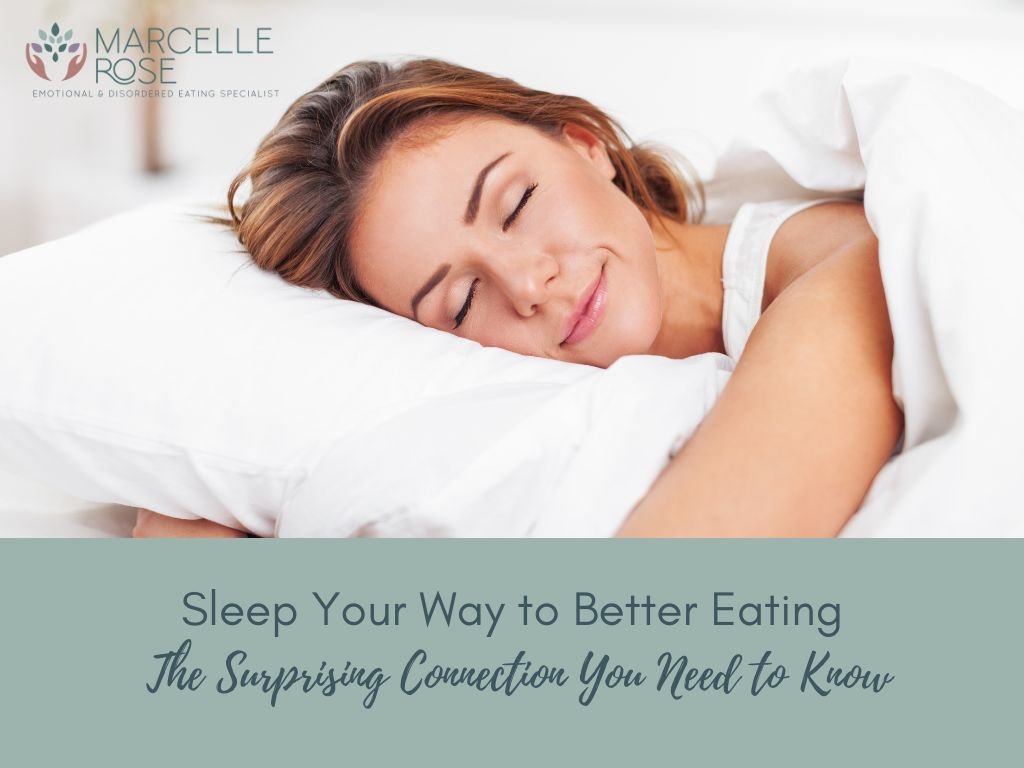Sleep Your Way to Better Eating: The Surprising Connection You Need to Know
Your eating habits play a significantly role in how well you sleep, but did you know that your sleep patterns can have quite an influence on your eating behaviour?
While much attention is typically placed on the food itself when it comes eating challenges such as emotional and binge eating, there are many other factors to consider and sleep should not be overlooked.
THE HORMONE CONNECTION
Lack of adequate sleep can lead to physical consequences such as hormonal imbalances, which may increase your hunger and trigger cravings for the less helpful foods. Acknowledging that insufficient sleep can exacerbate these cravings as a physiological response, rather than a personal failing, can foster self-compassion. Why is this beneficial? Instead of trying to offset binge eating episodes by restricting your food later, it encourages a shift towards self-care rather than sabotage. A focus on improving sleep won’t just help with eating challenges; It will also bring about significant health benefits across the board.
MEAL TIMINGS
What and when you eat can impact your sleep; insufficient daytime eating followed by overeating in the evening, especially close to bedtime, can disrupt your sleep. Malnourishment can elevate your stress levels and adversely affect sleep. Ensuring you eat enough and stabilising your blood glucose with sufficient protein, fibre, natural fats and slow-releasing carbohydrates can make a difference. Consider the balance of your meals rather than striving for perfection (which doesn’t exist – by the way). Of course, a good night’s sleep will make it easier to eat in a balanced way the next day.
PSYCHOLOGICAL IMPACT
Poor sleep quality also has psychological ramifications, affecting the higher brain functions responsible for self-control, decision-making, and rational thinking. Adequate sleep is necessary to restore these cognitive processes, allowing for more constructive decision-making. Conversely, chronic stress driven by negative thoughts about food, dieting or your body is also likely to disrupt your slumber. This can keep you stuck in a perpetual cycle of negative thinking, poor sleep and unwanted eating behaviours.
Furthermore a reminder that alcohol consumption, which you may turn to in times of stress, can disrupt your REM sleep, impacting overall sleep quality. It’s also worth reflecting on your individual sensitivity to caffeine, which varies from person to person, and may be playing a part in night time wakefulness.
Six Tips for a Good Night’s Sleep:
Focus on one small adjustment at a time and remember that consistency is key!
Experiment with Eating Earlier: Consider experimenting with eating earlier a few days a week. This is about understanding your body and finding what works best for you. If needed, have a nutritious snack before bedtime to avoid going to bed hungry.
Eat Enough: Ensure you are getting enough food throughout the day to help stabilise your blood glucose and to help prevent disturbed sleep.
Embrace Outdoor Time and Daily Movement: Spend time outdoors when you can and take some gentle exercise every day. A brisk walk ticks both boxes.
Set Up a Sleep-Friendly Environment: Dim the lights and limit electronic device use before bedtime. This will reduce your exposure to sleep-blocking blue light and minimise nighttime stimulation. Ensure your bedroom is dark and kept at a comfortable temperature for optimal sleep conditions.
Keep to a Consistent Sleep Routine: Avoid napping during the day and go to bed at the same time every night. This can positively impact your body's ability to reset your circadian rhythm, promoting better sleep.
Minimise Alcohol and Caffeine Intake: Avoid using alcohol to help you sleep. Alcohol is a stimulant and can mess with your sleep. Similarly, limit caffeine consumption and avoid drinking it later in the day.
As you work on your eating challenges, remember that fixing your relationship with food involves a multifaceted approach. By addressing the physical, emotional and psychological aspects, you can gradually build a lifestyle that supports you on this journey.
Do you long for a happy relationship with food, but are feeling lost on where to begin? Grab my FREE guide Breaking the Cycle - Your First Steps to Healing Your Relationship with Food, to kickstart your journey today
This invaluable resource will help you:
✔️Know when you’re really hungry and when you’re not
✔️Learn when to eat that’s best for you
✔️Know the best snacks to help you stop craving and feeling out of control

